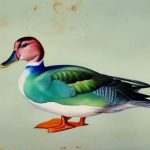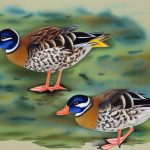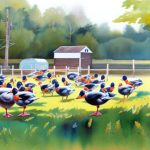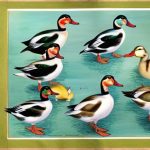Ducks are a popular choice for backyard poultry enthusiasts due to their charming personalities, low maintenance requirements, and ability to provide both eggs and meat. There are numerous duck breeds to choose from, each with its own unique characteristics and traits. From the classic Pekin duck to the strikingly beautiful Indian Runner, there is a duck breed to suit every preference and purpose. Whether you are looking for a prolific egg layer, a quiet and docile pet, or a robust meat bird, there is a duck breed that will meet your needs. Understanding the different breeds and their specific attributes is essential for anyone considering adding ducks to their flock.
Table of Contents
- 1 Popular Duck Breeds at Tractor Supply
- 2 Factors to Consider When Choosing a Duck Breed
- 3 Care and Maintenance of Duck Breeds
- 4 Health and Wellness of Duck Breeds
- 5 Breeding and Reproduction of Duck Breeds
- 6 FAQs
- 6.1 What are the different duck breeds available at Tractor Supply?
- 6.2 What are the characteristics of Pekin ducks?
- 6.3 What are the characteristics of Khaki Campbell ducks?
- 6.4 What are the characteristics of Rouen ducks?
- 6.5 What are the characteristics of Mallard ducks?
- 6.6 What should I consider before purchasing ducks from Tractor Supply?
Key Takeaways
- There are many different duck breeds, each with their own unique characteristics and traits.
- Popular duck breeds at Tractor Supply include Pekin, Rouen, Khaki Campbell, and Mallard ducks.
- When choosing a duck breed, consider factors such as space requirements, temperament, egg production, and purpose (meat or eggs).
- Care and maintenance of duck breeds involves providing proper housing, feeding, and access to water, as well as regular health checks and grooming.
- Health and wellness of duck breeds can be maintained through proper nutrition, regular exercise, and vaccination against common diseases.
- Breeding and reproduction of duck breeds requires understanding mating behavior, providing proper nesting areas, and ensuring the health of both the male and female ducks.
- In conclusion, resources for duck breeders include books, online forums, and local agricultural extension offices for further information and support.
Popular Duck Breeds at Tractor Supply
Tractor Supply is a popular destination for poultry enthusiasts, offering a wide variety of duck breeds to choose from. Some of the most popular duck breeds available at Tractor Supply include the Pekin, Khaki Campbell, and Rouen. The Pekin duck is a large, white bird known for its excellent meat production and calm demeanor, making it a favorite for backyard farmers. The Khaki Campbell, on the other hand, is prized for its exceptional egg-laying abilities, with some hens laying up to 300 eggs per year. The Rouen duck is a beautiful breed with striking plumage and is often raised for both meat and exhibition purposes. These are just a few examples of the diverse duck breeds available at Tractor Supply, each with its own unique qualities and characteristics.
Factors to Consider When Choosing a Duck Breed
When choosing a duck breed, there are several factors to consider to ensure that you select the right fit for your needs and lifestyle. One important consideration is the purpose for which you are raising ducks. If you are primarily interested in egg production, then breeds such as the Khaki Campbell or Runner ducks may be the best choice. For those looking for a dual-purpose breed for both eggs and meat, the Pekin or Rouen ducks may be more suitable. Additionally, temperament and behavior should be taken into account, as some breeds are more docile and friendly while others may be more skittish or independent. Climate and environment should also be considered, as some breeds are better suited to cold or hot climates. Finally, availability and accessibility of the breed in your area should be factored in when making your decision.
Another important factor to consider when choosing a duck breed is space and housing requirements. Some breeds are more active and require more space to roam and forage, while others are content with smaller living quarters. It’s essential to ensure that you have the appropriate space and housing set up to accommodate the specific needs of your chosen duck breed. Additionally, dietary needs and maintenance requirements should be taken into consideration when selecting a breed, as some may have specific dietary preferences or health considerations that need to be addressed.
Care and Maintenance of Duck Breeds
Proper care and maintenance are essential for the health and well-being of duck breeds. Providing a clean and secure living environment is crucial, as ducks are susceptible to predators and environmental hazards. Housing should be spacious enough to allow for natural behaviors such as foraging and swimming, with access to fresh water for bathing and drinking. Regular cleaning of housing and nesting areas is necessary to prevent disease and maintain hygiene.
Dietary needs should also be carefully considered when caring for duck breeds. A balanced diet that includes commercial feed, fresh water, and access to forage is essential for optimal health and productivity. Additionally, providing appropriate supplements such as grit and oyster shell can help support digestive health and egg production in laying hens. Regular monitoring of weight and overall condition can help identify any potential health issues early on.
Regular health checks and preventative care are important aspects of maintaining duck breeds. Monitoring for signs of illness or injury, such as changes in behavior, appetite, or appearance, can help catch potential issues before they become serious. Vaccinations and parasite control should also be part of a comprehensive health care plan for duck breeds. Establishing a relationship with a veterinarian who is knowledgeable about poultry care can provide valuable support in maintaining the health of your duck flock.
Health and Wellness of Duck Breeds
The health and wellness of duck breeds are paramount to their overall well-being and productivity. Ducks are generally hardy birds but can be susceptible to certain health issues if not properly cared for. Common health concerns for duck breeds include respiratory infections, bumblefoot, egg binding in females, and parasites such as mites and worms. Regular observation and monitoring of your ducks can help identify any potential health issues early on.
Preventative measures such as proper nutrition, clean living conditions, and regular veterinary care can help minimize the risk of health problems in duck breeds. Providing a balanced diet that meets their nutritional needs is essential for maintaining overall health and immune function. Access to clean water for drinking and bathing is also important for preventing dehydration and maintaining hygiene.
In addition to physical health, the mental well-being of duck breeds should also be considered. Ducks are social animals that thrive in the company of others, so providing opportunities for social interaction and enrichment can contribute to their overall happiness and contentment. Access to outdoor space for foraging, swimming, and exploring can help fulfill their natural instincts and promote mental stimulation.
Breeding and Reproduction of Duck Breeds

Breeding and reproduction are important considerations for those interested in raising duck breeds. Understanding the reproductive behavior and needs of ducks is essential for successful breeding and hatching of healthy offspring. Ducks are seasonal layers, with peak egg production typically occurring in the spring and summer months. Providing appropriate nesting areas with comfortable bedding materials can encourage hens to lay eggs regularly.
Incubation of eggs can be done naturally by broody hens or artificially using an incubator. Proper temperature and humidity levels are critical for successful incubation, with regular monitoring of eggs necessary to ensure their viability. Once hatched, ducklings require warmth, protection, and access to food and water to thrive.
Selective breeding can be used to improve specific traits or characteristics within a duck breed, such as egg production, meat quality, or coloration. Careful selection of breeding stock based on desirable traits can help maintain the integrity of the breed while improving overall quality.
In conclusion, choosing the right duck breed requires careful consideration of various factors such as purpose, temperament, climate suitability, space requirements, dietary needs, and availability. Proper care and maintenance are essential for the health and well-being of duck breeds, including providing a clean living environment, balanced nutrition, regular health checks, and preventative care. Understanding the reproductive behavior of ducks is important for successful breeding and hatching of healthy offspring. For those interested in raising duck breeds, Tractor Supply offers a variety of popular duck breeds to choose from along with the necessary supplies and resources for successful duck keeping.
Resources for Duck Breeders
For those interested in learning more about duck breeds and poultry care, there are numerous resources available to provide valuable information and support. Books such as “Storey’s Guide to Raising Ducks” by Dave Holderread offer comprehensive guidance on all aspects of duck keeping including breed selection, housing, feeding, health care, breeding, and more. Online forums and communities such as BackYardChickens.com provide opportunities to connect with other poultry enthusiasts to share experiences, ask questions, and seek advice on raising ducks.
Local agricultural extension offices or poultry clubs may also offer workshops or seminars on poultry care and management that can provide valuable hands-on learning opportunities. Establishing relationships with local breeders or farmers can also offer valuable insights into specific breed characteristics and practical tips for successful duck keeping.
Overall, having access to reliable resources and support networks can help ensure a positive experience in raising duck breeds while promoting the health and well-being of these charming birds.
Looking for the perfect duck breed for your farm? Tractor Supply offers a wide variety of duck breeds to choose from, each with its own unique characteristics and benefits. Whether you’re looking for a good egg layer or a friendly pet, there’s a duck breed for you. And if you’re considering raising ducks, you might also be interested in learning how to convert a shed into a chicken coop. Check out this informative article on Poultry Wizard about converting a shed to a chicken coop here. It’s a great resource for anyone looking to create a comfortable and functional space for their feathered friends.
FAQs
What are the different duck breeds available at Tractor Supply?
Tractor Supply offers a variety of duck breeds including Pekin, Khaki Campbell, Rouen, and Mallard ducks.
What are the characteristics of Pekin ducks?
Pekin ducks are known for their white feathers, orange bills, and friendly disposition. They are a popular choice for meat production and are also good egg layers.
What are the characteristics of Khaki Campbell ducks?
Khaki Campbell ducks are known for their khaki-colored feathers and excellent egg-laying abilities. They are a popular choice for backyard duck enthusiasts.
What are the characteristics of Rouen ducks?
Rouen ducks are known for their striking plumage, which resembles that of a Mallard duck. They are a dual-purpose breed, suitable for both meat and egg production.
What are the characteristics of Mallard ducks?
Mallard ducks are known for their beautiful iridescent green heads and are the ancestors of many domestic duck breeds. They are often kept for ornamental purposes.
What should I consider before purchasing ducks from Tractor Supply?
Before purchasing ducks from Tractor Supply, consider the space and resources needed to properly care for them, including a suitable enclosure, access to water, and appropriate feed. Additionally, check local regulations regarding the keeping of ducks.
Meet Walter, the feathered-friend fanatic of Florida! Nestled in the sunshine state, Walter struts through life with his feathered companions, clucking his way to happiness. With a coop that’s fancier than a five-star hotel, he’s the Don Juan of the chicken world. When he’s not teaching his hens to do the cha-cha, you’ll find him in a heated debate with his prized rooster, Sir Clucks-a-Lot. Walter’s poultry passion is no yolk; he’s the sunny-side-up guy you never knew you needed in your flock of friends!







